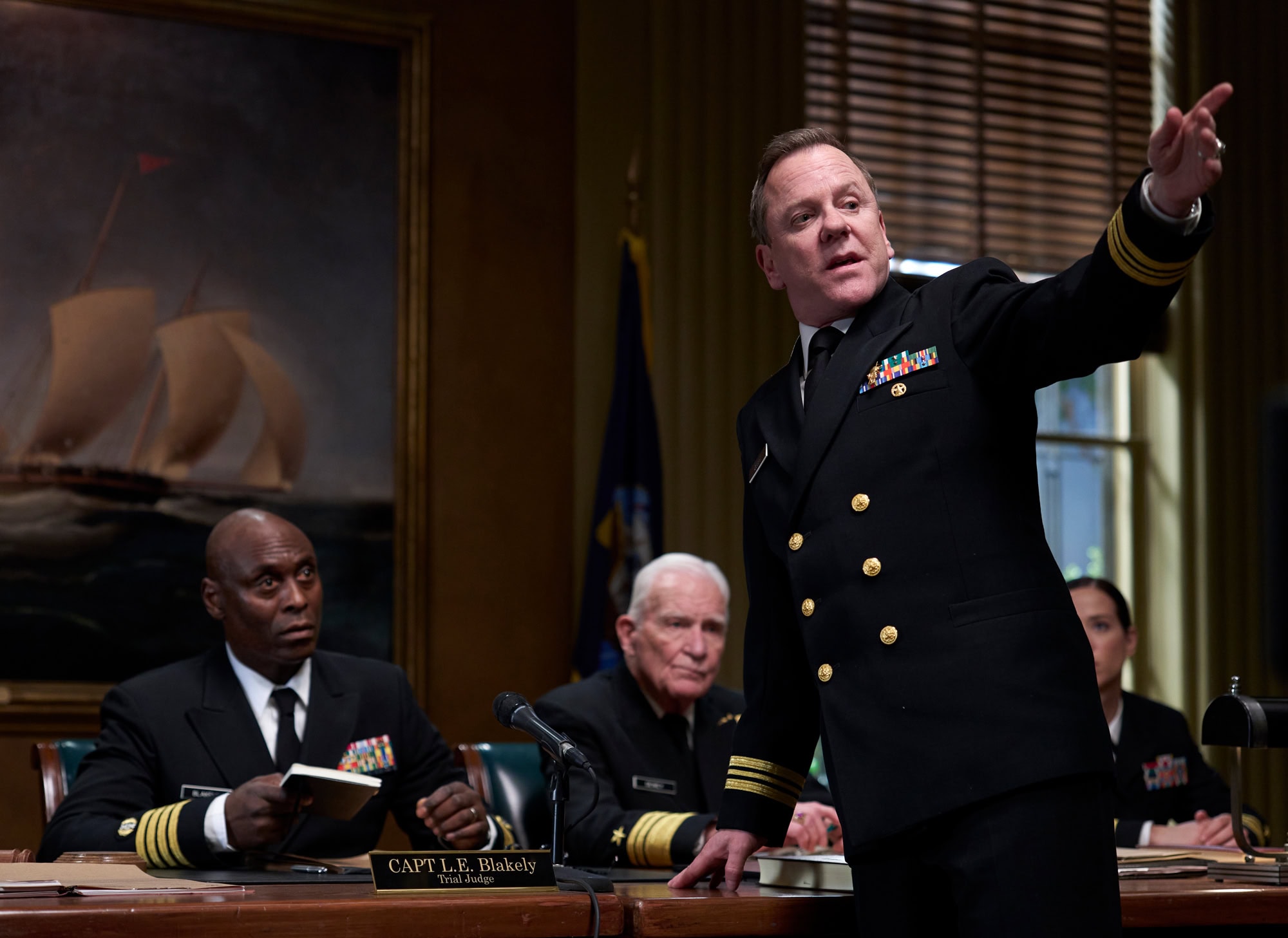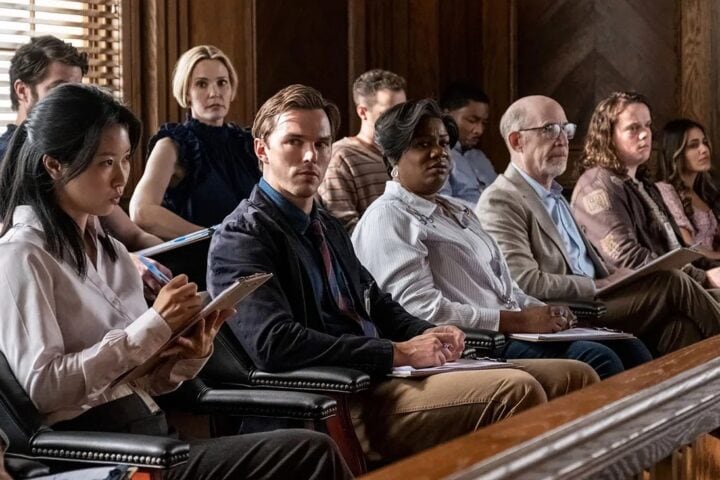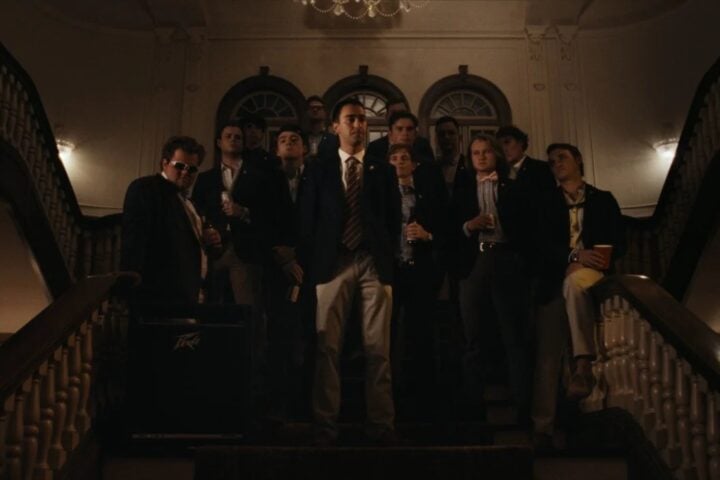The modest aims of director William Friedkin’s final film, The Caine Mutiny Court-Martial, are evident from the start. The film is an adaptation of Herman Wouk’s 1954 two-act play of the same name, which the author adapted from his Pulitzer Prize-winning 1951 novel The Caine Mutiny. And both Wouk’s play and Friedkin’s film jettison the book’s maritime actions to focus solely on the military tribunal that results from it.
That means that nearly the entire film takes place within a small hearing room where military judges hear arguments for and against Lieutenant Stephen Maryk (Jake Lacy), who faces both discharge and imprisonment for usurping the command of Lt. Commander Phillip Queeg (Kiefer Sutherland) during a storm. Maryk and a handful shipmates argue that Queeg lost control of his senses and had to be displaced, but the burden of proof for upending the military’s fiercely maintained chain of command stacks the odds against the lower-ranked officer.
Compared to Friedkin’s triumphant, highly stylized adaptations of Tracy Letts’s Bug and Killer Joe, The Caine Mutiny Court-Martial has all of the hallmarks of a filmed play. Its drab, naturalistic setting offers few opportunities for springing moments of surprising visual élan, and, indeed, the handful of master shots that capture the room in full only further emphasize what a nondescript chamber the place is. As a private military hearing, the trial doesn’t even offer the potentially exciting reactions of a jury or public witnesses.
Nonetheless, Friedkin finds subtle ways to communicate both the power imbalance between the characters and the shifting dynamics of the trial. In Queeg and Maryk’s opening testimonies, Michael Grady’s camera remains mostly at a medium-shot distance, gently circling around each man during his respective statement, in the process suggesting that they’re on relatively equal footing. But as the prosecutor, Commander Challee (Monica Raymund), begins to grill Maryk, the camera moves in subtly closer to reflect the natural inclination of the military to side with a longer-tenured, higher-ranked officer in a dispute of this nature.
Later in The Caine Mutiny Court-Martial, when an enlisted quartermaster, Junius Urban (Gabe Kessler), is called as a witness, the camera makes blatantly noticeable push-ins to reflect how rapidly the young man becomes flummoxed by Challee’s aggressive questioning on Queeg’s fitness for duty and Maryk’s flimsy justification for revolt. The suffocatingly close repositioning of the frame captures how powerless the sailor is within the hierarchy of the military.
Most of the film’s performances fit within the standard rubric of the courtroom drama, with the flat delivery of initial testimony gradually growing more frantic as more cracks in stories are caught or lawyers grow more vicious with their questions. The two standouts are Jason Clarke, who plays Maryk’s defense attorney, Lieutenant Barney Greenwald, with a calculating calm that occasionally hints at a distaste for the trial as much for what it might do to his client as the other men on the stand, and Sutherland as the increasingly erratic Queeg.
Queeg’s initial testimony is cocky to the point of jocularity as the superior officer speaks almost as if this is all a big misunderstanding (albeit one he wants to see punished to the full extent of regulations), and a small scar on his cheek tugs Sutherland’s arrogant grin even further into a kind of mocking rictus. As Greenwald starts to puncture Queeg’s self-belief, though, that smile warps into a twisted snarl of outrage that makes the commander look like a madman out of an expressionistic silent, flipping the script on the trial’s presumptions of his stability.
Much has been made of streaming’s potential to be the new marketplace for the medium-budget, original movie in a theatrical landscape that increasingly cares only for the biggest, most boisterous, most IP-driven blockbusters. Friedkin, though, uses this film to hearken back to an even earlier era, chiefly the original golden age of television and the platform that programs like Playhouse 90 and Alfred Hitchcock Presents gave to rising filmmakers like John Frankenheimer, Robert Altman, and Friedkin himself to prove their mettle with low budgets and tight production deadlines. The Caine Mutiny Court-Martial brings Friedkin’s career full circle, showing off the no-nonsense skills that gave him the credibility to exercise his wildest ambitions. In its own way, it’s as suitable a final work as a culminating magnum opus.
Since 2001, we've brought you uncompromising, candid takes on the world of film, music, television, video games, theater, and more. Independently owned and operated publications like Slant have been hit hard in recent years, but we’re committed to keeping our content free and accessible—meaning no paywalls or fees.
If you like what we do, please consider subscribing to our Patreon or making a donation.






